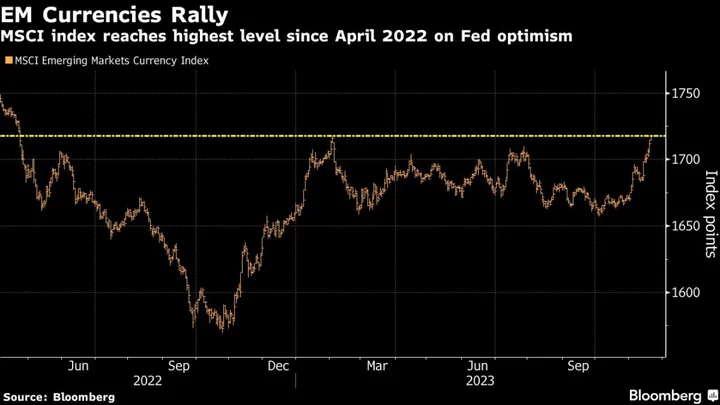Nearing the end of a tumultuous year for assets in developing countries, a key index of emerging-market currencies is poised for its best performance since 2017 as a late rally pushed investors to lock in higher yields while they still can.
The benchmark MSCI EM Currency Index advanced 0.4% to 1718.01 on Tuesday, lifting its gains this year to 3.44%. The milestone comes after a rebound since early October amid improving US inflation data that sparked expectations for an end to interest-rate hikes by the Federal Reserve, and even a possible cut in June.
“The case for an EM rebound is growing, but the pace of recent gains could prompt some traders to take profit and cause volatility in the near-term,” said Eugenia Victorino, head of Asia strategy at Skandinaviska Enskilda Banken AB. “This is not to say that the direction is not correct. But the pace of the rebound was too fast.”
The recovery for developing-nation currencies comes in a year marked by whipsawing moves as traders were frequently caught off-guard with premature wagers on China’s economic growth, a Fed “pivot” and the path of local inflation. After October data showed a sharp deceleration in US consumer-price growth, global markets seemed to reach a consensus that the era of monetary tightening was finally over.
That’s put the dollar on course for its biggest losses in a year and bolstered the case for investing in emerging markets.
EM Leaders
Much of the return this year was earned in Latin America and Eastern Europe, where central banks pursued some of the most aggressive rate hikes over the past three years.
The currencies of Poland and Hungary have been the stars of the rebound since early October. Elections that returned a pro-European Union and fiscally prudent alliance to power in Warsaw have helped the zloty, while easing inflation and a relatively hawkish central bank have buoyed the forint.
Besides these two currencies, some of the best carry returns this year have come from Latin America. The Colombian and Mexican pesos, and the Brazilian real have each handed investors at least 15% gains, while bets on the Turkish lira and Malaysian ringgit have lost the most.
Goldman Sachs Group Inc. strategists expect emerging markets to continue to provide attractive carry returns in 2024. Half of the 10% returns expected from sovereign bonds next year will come from carry, analysts including Andrew Tilton wrote in the bank’s outlook report, referring to gains from borrowing in currencies like the dollar and investing in the currencies of higher-yielding countries.
(Updates with analyst comment in 3rd paragraph.)
Author: Srinivasan Sivabalan and Karl Lester M. Yap









